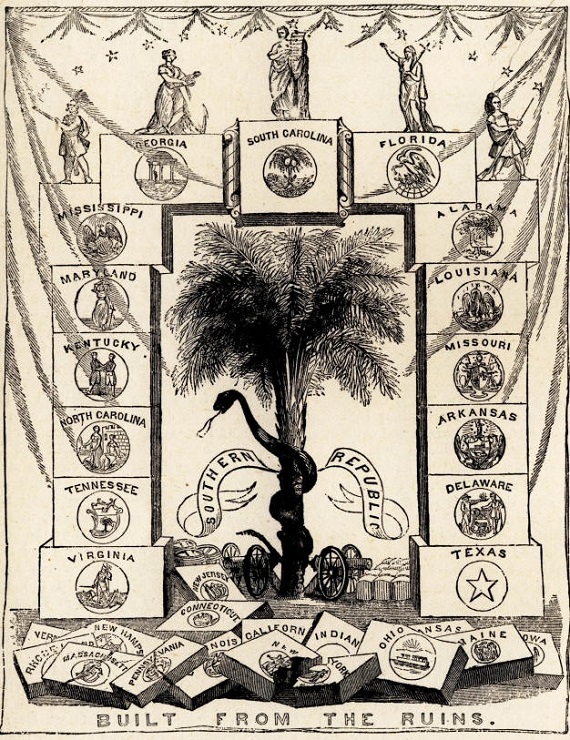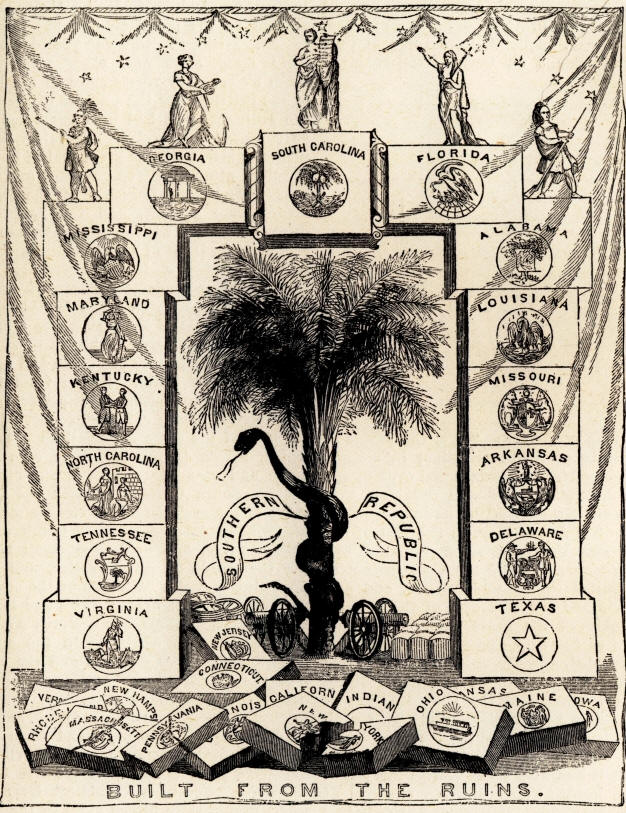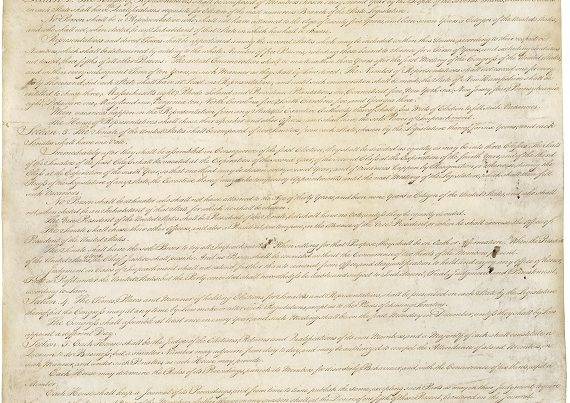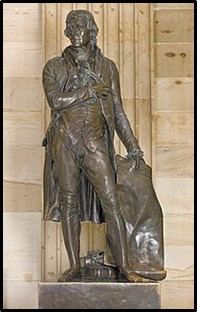
That Southern secession was ultimately about independence with or without slavery is easily determined by primary sources. Often I hear that the primary sources I quote in defense of Southern secession are “cherry picked” or “out of context.” Those making these charges will then point to the four Declarations of Causes or The Cornerstone Speech as proof of my lack of context. Let’s take a look at the “context.”
The pre-secession context of all these documents was the irresponsible demands of Northern abolitionists for immediate, uncompensated emancipation, backed by terrorist activity. The terrorist threats alone were reasons for the South to close ranks and secede. The defense of slavery against demands for “immediate emancipation,” which would have surely led to an economic and social disaster, not to mention a humanitarian crises for the freed slaves, should not be confused with a desire to preserve slavery! Slavery was an institution long prior forced upon the South, and in 1861 it was an inherited institution for which Lincoln himself admitted the South did not desire, and that even he had no idea how to end:
“I have no prejudice against the Southern people. They are just what we would be in their situation. If slavery did not now exist among them, they would not introduce it… When it is said the institution exists, and it is very difficult to get rid of it in any satisfactory way, I can understand and appreciate the saying. I surely will not blame them for not doing what I should not know how to do myself.”
Add to all this Northern politicians who looked the other way, some even giving tacit, some explicit, approval to this otherwise small radical group of abolitionists mostly hated in the North. Northern politicians also played the “expansion of slavery” card to play upon the racist fears of Northerners who did not want to live with blacks. Their purpose was to build a sectional political coalition in a Northern population, which vastly outnumbered the South. In doing so they could use majorities in both houses of Congress to exploit the South economically. Their platform to keep slavery out of the territories they admitted had nothing at all to do with a concern for the slaves. The leading proponent of banning slavery in the territories, David Wilmot, made clear:
“I have no squeamish sensitiveness upon the subject of slavery, no morbid sympathy for the slave. I plead the cause and rights of white freemen. I would preserve to free white labor a fair country, a rich inheritance, where the sons of toil, of my own race and own color, can live without the disgrace which association with Negro slavery brings upon free labor.”
It was all about keeping blacks slave or free, out of the territories. It was also a strategy to keep Southerners from settling and forming pro-South states in the territories. The North could not allow the South to build a firewall in the Senate by the creation of more pro-South States in the territories. Jeff Davis saw through this strategy:
“Why is its exercise sought? Why is this resolution to obstruct the extension of slavery into the Territories introduced? It must be for the purpose of political power; it can have no other rational object… It is, then, for the purpose of political power; and can those who, in violation of constitutional rights, seek and acquire political power, which, in progress of time, will give them the ability to change the Constitution of the United States, be supposed just then to be seized with a feeling of magnanimity and justice, which will prevent them from using the power which they thus corruptly sought and obtained? “
This is the pre-secession context of the Declarations of Secession and the “Cornerstone Speech” previously mentioned. This is not to mention the years of Northern sectional antagonisms toward the South, the cultural differences, and a Northern determination to create the Union in its own image. It is a context conveniently ignored by those with a strange “need” to vilify the South.
The post-secession context of those documents, which is also conveniently ignored, is filled with Southern assertions that preserving and extending slavery is not their cause. Assertions such as these:
(Davis): “We are not fighting for Slavery. We are fighting for independence, and that or extermination we will have… (Interviewers): “And Slavery, you say, is no longer an element in the contest?” (Davis): “No it is not, it never was an essential element. It was only a means of bringing other conflicting elements to an earlier culmination. It fired the musket which was already capped and loaded.” Jefferson Davis as interviewed by Messrs. Jaques and Gilmore, 1864
“Their object, they allege, is to prevent the extension of slavery, and ours to extend it, thus making the issue between them and us to be the naked question, shall slavery be extended or not… So far from maintaining the doctrine, which the issue implies, we hold that the Federal Government has no right to extend or restrict slavery… Entertaining these opinions, we ask not, as the North alleges we do, for the extension of slavery. That would make a discrimination in our favor, as unjust and unconstitutional as the discrimination they ask against us in their favor… What then we do insist on, is, not to extend slavery, but that we shall not be prohibited from immigrating with our property, into the Territories of the United States, because we are slaveholders…” John C. Calhoun, 1849
Haters of the South simply choose to ignore assertions such as these in their deep-seated need to define Southern Americans as evil. But most telling is their ignoring the “actions” of the post-secession South that clearly demonstrate the Southern cause was not preserving and extending slavery.
Here are just a few of those actions:
1- by secession, the South cut itself off from any claim to the territories, much less the right to expand slavery there. But of course they had no desire to take slavery there anyway. Theirs was a principled desire to have equal rights and access to the territories. Why would they ever desire to expand the semi-tropical institution of slavery into the arid Midwest lands where it was of no benefit? Even a staunch antislavery Northerner like Senator Daniel Webster said he would not vote to ban slavery in the territories because God, by environment, had already banned its expansion there:
“I would not vote to put any prohibition into it whatever. The use of such a prohibition would be idle, as it respects any effect it would have upon the Territory; and I would not take pains to re-affirm an ordinance of Nature, nor to re-enact the will of God.”
There was no desire to expand slavery in the territories as Southerners often said in pre-secession documents. This is CONTEXT.
2- having seceded, the South turned down every offer made by Lincoln to return to the Union and keep slavery. The most significant was the Corwin Amendment, which would have placed slavery beyond the amendment process making it forever permanent as long as Southern States desired. All the South need do is return to the Union and it had the votes to easily ratify. Corwin had already passed both houses of a Republican controlled congress by super-majorities. And several Northern States had already ratified it. All the South need do was return to the Union and slavery was protected by what would have been one of only a few amendments in the Constitution that could never be altered! The South seceded anyway because preserving slavery was not its cause. This is CONTEXT!
3- another offer made by Lincoln to keep slavery was when he offered the South the opportunity to return to the Union by January 1863 and the Emancipation Proclamation would be discarded. By returning to the Union before the proclamation went into effect, Southern slavery would once again be protected by the US Constitution. And the Corwin Amendment still on the table would make the Constitution beyond Congress’ power to change as far as slavery was concerned. The South seceded anyway because preserving slavery was not their cause. This is CONTEXT!
4- at the Hampton Roads Peace Conference in 1865 attended by Lincoln and Seward, the latter stated to the Southern delegation that if they returned to the Union, they would have enough votes to defeat the 13th Amendment banning slavery. Lincoln raised no objection to the suggestion. The South seceded anyway because preserving slavery was not their cause. This is CONTEXT!
5- four of the eleven seceded States did not secede until Lincoln called for troops to invade the seven seceded States in the Deep South. If secession was all about “preserving and extending slavery,” why didn’t the entire slave holding States secede at the same time? Slavery was not the cause of the CSA. This is CONTEXT!
6- in the first year of secession the one thing the South was willing to END to make secession a success was SLAVERY. The historical evidence is clear that in the Spring of 1862 the South began offering to end slavery in hopes of gaining French and British support in its war for Southern independence. France agreed to do so if Britain would ally with them. According to the Belgian paper “The Independent Belge,” a French diplomat went to Britain to push for alliance on behalf of the CSA. Britain agreed but said it wanted to wait until “the Roman Problem” was resolved. Unfortunately for the CSA, the Roman Problem was not resolved until 1871. So the offer to end slavery remained on the table. Later in 1864, CS Congressman Duncan Kenner, the largest slaveholder in Louisiana, convinced Jeff Davis to let him travel to London to try and convince the British to act on the CS offer to end slavery in exchange for military support. But time ran out, while Kenner was talking to the British, when Lee surrendered at Appomattox.
This willingness to end slavery to secure independence is absolute proof that when Southerners said they did NOT secede to “preserve and extend slavery,” they meant it. You do not give up your cause for seceding in order to successfully secede. That would make no sense!!! CS Sec of State Judah Benjamin gave a note to Kenner for him to give to CS European diplomat Slidell which explains why the South was willing to endure the great economic and humanitarian hardship of ending slavery:
“The sole object for which we would ever have consented to commit our all to the hazards of this war, is the vindication of our right to self-government and independence… For that end no sacrifice is too great, save that of honour.’” Judah Benjamin to John Slidell, Dec 27, 1864.
The South was willing to end slavery to gain self-government and independence. This is CONTEXT!
Now go back and read the only four State’s Declarations of Secession that even mention slavery, while considering this context. Note they do not say their ultimate cause is to “preserve and extend slavery.” They say slavery is the “immediate cause” or is “thoroughly identified with slavery,” but they do not say slavery is “the cause.” To be “identified with” something is not to be that something. To be an “immediate cause” is not to be “the only cause.” Why they stated it this way is because there was a long list of reasons that the South chose to secede, and the most recent and legally egregious were issues regarding slavery. The ultimate cause of secession was not slavery, but slavery issues were identified with that ultimate cause. Often Southerners said slavery was the mere “occasion” and not “the cause” of secession and war:
“Slavery was the mere occasion and not the object or end of this war. The South is fighting for National independence and freedom from Yankee domination. The people are willing to sacrifice all the slaves to the cause of freedom.” Richmond Inquirer, 1863
This meant slavery was the most recent symptom of a more fundamental cause. That fundamental cause was Northern cupidity and concomitant infidelity to the Constitution for the purpose of gaining political and economic control over the South. The South’s primary sources are filled with this complaint. Slavery, like tariffs, internal improvements, subsidies, bounties, centralization, national banks, etc.… all were symptoms of a more fundamental cause for secession – Northern cupidity and infidelity to the Constitution. This is CONTEXT!
Nowhere does any secession document say the South wanted to “preserve and extend slavery.” Defending slavery against irresponsible demands is not the same as a desire for slavery. They simply wanted the Constitutional mandate, that the States be allowed to deal with slavery as they so desired, to be adhered to! Remember, they are writing these documents to those Northern States who cared nothing for the slave, but cared greatly about economic gain. These documents are reminding the North of the source of its revenue, and that it has no right to interfere with the legal property rights of any State. Especially when that interference could lead to a humanitarian disaster. Note that the Mississippi Declaration of Secession laments that the North, “seeks not to elevate or to support the slave, but to destroy his present condition without providing a better.”
There also could be a bit of strategy going on in talking about slavery in the Declarations in that it made Lincoln’s attempts to raise troops in the racist North appear to be for a war “about slavery.” The ploy almost worked as Northern newspapers and even members of Lincoln’s own cabinet were calling for him to “just let the South go.” Northerners wanted nothing to do with a war about slavery. Lincoln had to exclaim loudly and often that allowing the South to secede meant economic ruin for the North. It was about revenue and not slavery Lincoln repeated. This is CONTEXT!
Finally, a brief word about “the Cornerstone Speech,” a title applied to a speech, which refers to a few paragraphs buried in the middle of the speech that is more about Constitution than cornerstone. And even that “cornerstone analogy” is taken from a SCOTUS Pennsylvania justice named Baldwin who was talking about a Constitutional principle. Stephen’s point was both the US and CS Constitutions had the same cornerstone. There is nothing here about preserving slavery. It is only a couple of paragraphs later Stephens talks about slavery being used to educate and thereby assimilate blacks into Christian society:
“We hear much of the civilization and Christianization of the barbarous tribes of Africa. In my judgment, those ends will never be attained, but by first teaching them the lesson taught to Adam, that ‘in the sweat of his brow he should eat his bread,’ and teaching them to work, and feed, and clothe themselves…”
This intimates an emancipation and integration goal in Southern slavery. Something Lincoln believed forever impossible:
“There is a physical difference between the white and black races, which I believe, will forever forbid the two races from living together on terms of social and political equality.”
This is the CONTEXT of the documents mentioned – Northern abolitionists making irresponsible demands backed by terrorist activity, and Northern politicians using slavery to leverage sectional political advantage by keeping slaves, and therefore slave owners, bottled up in the South. Backing the South into such a corner made a humane emancipation impossible, and if attempted, a social/economic disaster inevitable. The South’s response in protecting and defending slavery when backed into such a corner should not be conflated with a desire to preserve and extend slavery. General Lee made this predicament clear when he said:
“The best men in the South have long desired to do away with the institution of slavery, and were quite willing to see it abolished. But unless some humane course, based on wisdom and Christian principles is adopted, you do them great injustice in setting them free.”
Neither Abolitionists nor politicians in the North ever proposed “some humane course” for emancipation. While opposing slavery in the abstract, they sought no real world solution that held concern for the slaves. All they desired was to cut the slave off from the welfare of the master to “die out.” Or they sought to colonize them to any godforsaken place but here. Southerners were repulsed by such callous solutions. Jeff Davis expressed shock at the desire for the slaves to “die out,” and Southern magazines such as The Southern Literary Messenger printed poems recited by Southerners opposed to seeing the black folk they had been raised with deported:
“What! Colonize old coachman Dick!
My foster brother Nat!
My more than mother when I’m sick,
Come Hal, no more of that!”
In his 1854 study titled, A Southside View of Slavery, Dr. Nehemiah Adams explains the corner into which the North had backed the South. Quoting a Southerner Adams writes, “If our friends at the North would devise ways in which we could dispose of these poor people for their good, I should then no longer be a ‘servant of servants.’” (Emphasis mine). To this Adams further elaborates:
“There are, probably, few who would not abstractly prefer free labor; but what shall be done with the blacks? There has never been a time in the history of our discussions on this subject, when, if the South had expressed her willingness to part with the slaves, we at the north could have agreed in what way they should have been disposed of. Who has ever proposed a plan of relief which could in a good measure unite us? What shall be done with the blacks? On the evils of slavery all are well informed. But as to this essential question we get no light”.
Knowing all this background, if you still claim the South was all about “preserving and extending slavery,” tell me again whom it is taking things out of CONTEXT???







Unlike other Lost Causers, this article actually does present real evidence which supports your arguments rather than simply ignoring or throwing out red herrings like other Lost Causers. The truth is that, on some level, I really sincerely want to believe in the Lost Cause myth that slavery was going to be abolished in a more orderly way, gradually and voluntarily, if the Confederate States had been allowed to declare independence, but I am still far from convinced.
At the very least I’d like to understand the actual truth, as difficult as that may be. Therefore, I do appreciate you using evidence from the actual time. I would consider anything after Appomattox to be basically inadmissible for this since by then Southerners were already trying to rewrite history.
I sincerely want to understand another person’s or nation’s point of view even if it’s not what I agree with. I strongly agree with historians that point out we need to understand the perspective of people as they saw things at that time, not from our modern perspective.
On some level, I love the fantasy of a glorious independent Confederate States of America, especially the land, the architecture, the people, the culture and hospitality, the food, the literature. I feel that, if given the chance, they could have had the opportunity in their later history to evolve and redeem themselves in future generations–a chance they never received. I myself have lived in Richmond for almost my whole life, and I can see things from both standpoints. My parents were Yankee transplants from Pennsylvania that moved to South Carolina before I was born.
The reason the Corwin amendment (as far as I can see, and I have just started researching this.) was not acceptable to the Southern states and was not sufficient to win them back was because it did nothing to protect or even acknowledge slavery in the new territories and future states. In other words, it didn’t go far enough to protect slavery. Jefferson Davis himself said as much. What would have been potentially successful for winning back the southern states was the Crittenden Compromise which would have protected or promised slavery south of the 36’30” parallel all the way to the Pacific. But this was not acceptable to what was left of the United States so that was never really offered.
It is very admirable that during diplomatic negotiations with the UK and France, the the CSA government presented their apparent willingness to end slavery. I’m not sure if I really believe those overtures or if was just a political tactic, and I suspect that those two countries probably didn’t believe them either.
The documentation at the time stating otherwise is simply too overwhelming. Everything before 1865 indicates that they wanted to keep slavery forever and ever, which they super promised in their Constitution would never change. However, I also believe that even if everyone at that time believed that that still their great grandchildren in future generations would try to change it, especially if pressured by the Britain and France, assuming they would continue to seek them out as allies and trading partners. Britain was even able to pressure the ottoman empire into officially giving up slavery. So in this sense, I think the Lost Causers may be at least indirectly right.
Southerners fought to protect their entire way of life of which slavery was a huge part. It seems ridiculous to claim it was not about slavery, unless I could be convinced otherwise. And again I sincerely would like to be. Sure it was about state’s rights, but those rights largely included the right to maintain slavery. Sure it was about economics (including taxes and tariffs), but their economic system largely depended on slavery, at least with the way it operated and they wanted to keep it that way. Sure it was really about their culture and way of life, but . . . yeah, slavery.
The truth is that the Confederate supporters sincerely did believe they were doing the right thing, that slavery really was a benevolent institution, and that it really was for the best, as much as that seems misguided to us today. Plus I can imagine that most did fear an insurrection and outright rebellion from former slaves, were they to be all suddenly freed, since whites knew on some level that they would be justified in seeking revenge! Most white Southerners shared this worldview across the socioeconomic spectrum.
Another reason it is hard for me to believe in the Lost Cause myth that slavery would have been abolished very soon in the Confederacy was that there were very few actual Abolitionists in those eleven states, even including the Union Loyalists. There were actually rather few Abolitionists even in the North too. “Abolitionist” was even considered a dirty word in the South. I do appreciate this Abbeville Institute website actually presenting some evidence for some actual Southern Abolitionists in the article “The Ballad of Confederate Abolitionists”. I would hope that if the Confederate States had prevailed in gaining their independence, that those rare specimens would have become more common and eventually won out given enough time. For Lost Causers, I know their heart is in the right place now with the claims that they make, but one still needs to understand the actual truth, whatever that may be.
Dismissing “out of hand” any Southern apologetics post-war regarding the motives for secession and waris a bias of modern academia and not one supported by the evidence. My perusing of primary sources in the antibellum and bellum South reveal that most of what they said and did then is supportive of what they said and did post-war. Don’t be too influenced by modern academia without a more careful examination of the context of the South’s “defense of slavery” that was based more on a reaction to the irresponsible onslaught of Northern abolitionism demanding immediate, uncompensated emancipation backed by terrorist threats, rather than any desire to perpetuate and extend slavery. Remember that Oskar Shindler defended slavery in his munition factories during WWII in order to prevent a far worse outcome for the Jewish slaves working in his factories. Sometimes slavery is defended not in the abstract, but in real world circumstances where the alternative was worse than the reality of slavery. The prevailing sentiment in the South had long been against slavery. The problem was how to end it in a manner justifiable to the South’s socio/economic condition as well as a humane outcome to the slaves. The only thing the North offered was a determination to end the political power of the South which it saw as a product of slavery. And so the North sought to end slavery to weaken the South politically, and to rid the Union of black flesh by either colonization or the Darwinian “dying out” of the slaves once cut off from the cradle to grave welfare of the master. Southerners were repulsed at both goals. So while most Southerners believed slavery a violation of natural rights, they knew that natrual rights doctrine demands that when the ideal is not available, you do what causes the most good and least harm. Slavery provided a means of managing nearly half the South’s population of mostly uneducated and destitute people, while protecting them from Northern anatiblack ambitions. At the same time slavery prevented the socio/economic disaster that would befall the South if it had to accommodate on its own all those people suddenly set free. The contezt of irresponsible and inhumane demands made by the North regarding slavery has to be considered in regards to the South’s defesnce of slaavery.
Actually, I admit that I stand corrected. Like many others, I was actually falling prey to anti-Confederate propaganda popular in the mainstream media. I have not found that the constitution of the CSA “super promised” that slavery would be protected forever. The only thing I was able to find was that the federal government of the Confederate states would stay out of the slavery issue and would not decide one way or the other, merely deferring to each state to decide for themselves. Even then, I suppose it was still open, and it was entirely possible that something like the 13th Amendment to the US Constitution could have been very well added to the Confederate Constitution at some later date.
Reply to Ben Holmberg:
I commend you for your intellectual honesty in noting and correcting your misconception. I suggest the “Real Lincoln” authored by Thomas J. DiLorenzo for a clearer picture of Lincoln and the Northern Mercantilism position prior to the war; including the initiation of the lie that the constitution created the States that was pushed by Chief Justice Story and adopted by Lincoln.
I also include the url for an article by DiLorenzo that speaks to the right of secession and other issues with Lincoln.
Constitutional Con Men
May 15, 2002
By Thomas J. DiLorenzo https://www.independent.org/news/article.asp?id=418
Thanks for your suggestions. I will definitely go check out those items sometime.
To Rob O’Barr.
Thank you for a well written and informative article that helps cut through the lies of the “Lincoln historian lobby” and the rewriting of history by the Northern establishment. Unfortunately, our founding and Constitution has been interpreted through this distorted lens, the consequences of which, on our liberties, we suffer through today.
I look forward to many more of your writings.